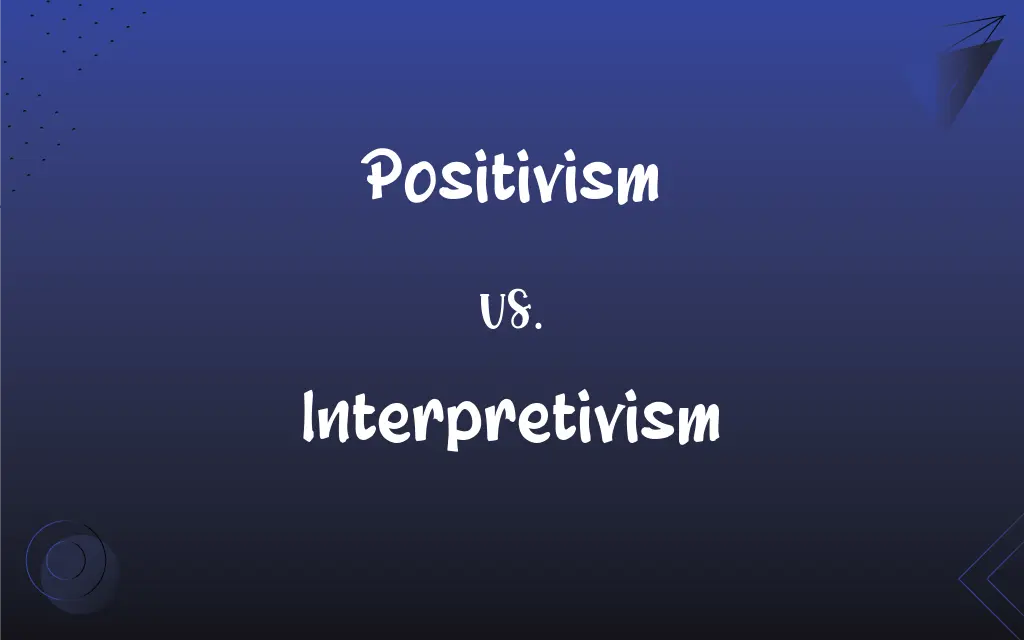Positivism vs. Interpretivism: What's the Difference?
Edited by Aimie Carlson || By Janet White || Published on January 27, 2024
Positivism emphasizes observable, empirical evidence and scientific methods. Interpretivism focuses on understanding the subjective, interpretive nature of human experience.

Key Differences
Positivism is grounded in the belief that knowledge should be based on observable, empirical evidence and scientific methods. In contrast, interpretivism emphasizes understanding the subjective, interpretive nature of human experience and social contexts.
In positivism, objective reality is considered knowable and quantifiable. Interpretivism, however, holds that reality is subjective and can be understood only through the meanings individuals attach to it.
Positivism often relies on quantitative methods to test hypotheses and theories. Interpretivism leans towards qualitative methods, seeking to understand individual perspectives and social processes.
The goal of positivism is to find general laws and patterns that govern human behavior. Interpretivism aims to understand the complexity of human experience, focusing on context and individuality.
Positivism views the researcher as detached and independent from the subject of study. Interpretivism sees the researcher as integral to understanding the social world, often participating in it.
ADVERTISEMENT
Comparison Chart
Basis of Knowledge
Observable, empirical evidence
Subjective experiences and meanings
View of Reality
Objective and quantifiable
Subjective and constructed
Research Methods
Quantitative methods
Qualitative methods
Research Goal
Identify general laws and patterns
Understand individual experiences and contexts
Role of Researcher
Detached observer
Integral, often participatory
ADVERTISEMENT
Positivism and Interpretivism Definitions
Positivism
Prioritizes quantitative methods for hypothesis testing.
Positivism favors statistical analysis to validate theories.
Interpretivism
Emphasizes subjective meanings and social context.
Interpretivism looks at how individuals interpret their social world.
Positivism
Emphasizes detachment of the researcher from the subject.
Positivism maintains that a researcher's biases should not influence the results.
Interpretivism
Utilizes qualitative methods for in-depth understanding.
Through interpretivism, researchers conduct interviews to understand personal perspectives.
Positivism
A philosophy emphasizing empirical evidence and scientific methods.
In positivism, researchers rely on experiments and data to understand phenomena.
Interpretivism
A philosophical approach focusing on understanding human experiences.
Interpretivism involves delving into people's subjective experiences to gain insights.
Positivism
Seeks objective truth through observable facts.
Positivism drives scientific inquiries in search of universal laws.
Interpretivism
Sees reality as constructed by individuals.
Interpretivism posits that people's perceptions shape their reality.
Positivism
Assumes an independent reality can be known.
Under positivism, scientists believe they can uncover objective truths about the world.
Interpretivism
Involves researchers actively engaging with subjects.
In interpretivism, the researcher's interaction with participants is crucial for understanding.
Positivism
A doctrine contending that sense perceptions are the only admissible basis of human knowledge and precise thought.
Interpretivism
Antipositivism
Interpretivism
Qualitative research
Interpretivism
A school of cultural anthropological thought founded by Franz Boas.
Interpretivism
(legal) A school of thought holding that law is not a set of given data, conventions, or physical facts, but what lawyers aim to construct or obtain in their practice.
FAQs
What is positivism?
Positivism is a philosophy that emphasizes empirical evidence and scientific methods to understand reality.
What is interpretivism?
Interpretivism is a philosophical approach focusing on the subjective nature and context of human experiences.
What types of methods do positivists favor?
Positivists favor quantitative methods like experiments and statistical analysis.
Can positivism and interpretivism be combined in research?
Yes, some research combines both approaches to gain a more comprehensive understanding.
Can positivism explain individual behaviors?
Positivism seeks to explain behaviors through general laws but may not fully account for individual variations.
How do positivism and interpretivism differ in their view of reality?
Positivism views reality as objective and quantifiable, while interpretivism sees it as subjective and constructed by individuals.
How does interpretivism contribute to understanding social phenomena?
Interpretivism helps in understanding social phenomena by exploring individual perspectives and contexts.
What research methods are common in interpretivism?
Interpretivism commonly uses qualitative methods, such as interviews and observations.
What is the role of the researcher in positivism?
In positivism, the researcher is a detached observer, minimizing personal bias.
Is positivism applicable in social sciences?
While positivism is used in social sciences, its applicability is sometimes debated due to the complexity of human behavior.
Is interpretivism useful in studying cultures?
Yes, interpretivism is particularly useful in studying different cultures and social settings.
What is the importance of context in interpretivism?
Context is crucial in interpretivism as it shapes individuals' interpretations and experiences.
How does the role of the researcher differ in interpretivism?
In interpretivism, the researcher actively engages with the subjects, often participating in the social context.
Does positivism rely on theory testing?
Yes, positivism involves testing theories against empirical evidence.
Is subjectivity a concern in interpretivism?
Subjectivity is inherent in interpretivism and is considered valuable for understanding human experiences.
How does interpretivism handle complex social issues?
Interpretivism delves into complex social issues by exploring individual perceptions and contextual factors.
How does interpretivism view the construction of knowledge?
Interpretivism views knowledge as constructed through personal experiences and social interactions.
Are positivist studies replicable?
Positivist studies aim for replicability as a mark of scientific rigor.
Can positivism address moral and ethical issues?
Positivism focuses on empirical facts and may not directly address moral and ethical considerations.
Do positivist studies use qualitative data?
Positivist studies primarily use quantitative data, but some may incorporate qualitative data for a broader perspective.
About Author
Written by
Janet WhiteJanet White has been an esteemed writer and blogger for Difference Wiki. Holding a Master's degree in Science and Medical Journalism from the prestigious Boston University, she has consistently demonstrated her expertise and passion for her field. When she's not immersed in her work, Janet relishes her time exercising, delving into a good book, and cherishing moments with friends and family.
Edited by
Aimie CarlsonAimie Carlson, holding a master's degree in English literature, is a fervent English language enthusiast. She lends her writing talents to Difference Wiki, a prominent website that specializes in comparisons, offering readers insightful analyses that both captivate and inform.







































































